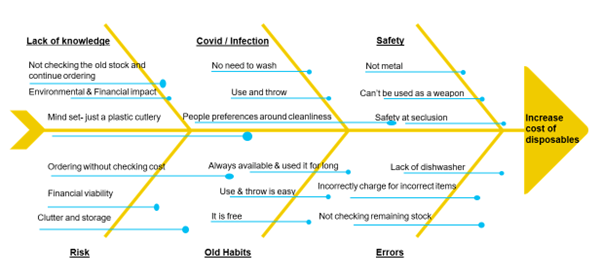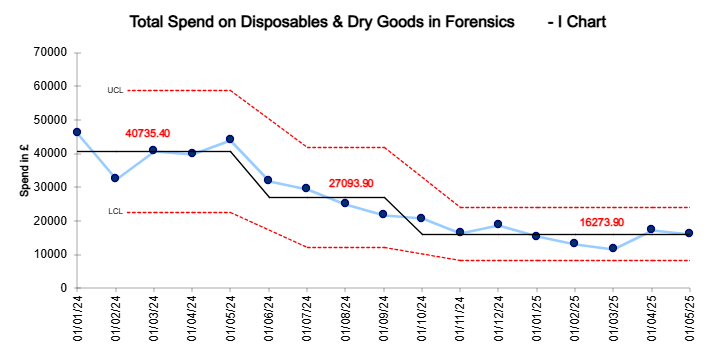
Environmental and Financial Sustainability in Forensics Directorate using Quality Improvement
1st July 2025
Written by Gita Patni (Welfare Rights & Recovery Lead), Helga Hakata (Lead Nurse), Pooja Kapoor (Executive Assistant), and William Diaz (Improvement Advisor)
In recent years there were concerted efforts for the NHS to slash the use of plastic materials in hospitals as part of its drive to reduce waste and make hospitals environmentally sustainable. Research has shown that if the NHS cuts its use of catering plastic in half it could mean over 100 million fewer items each year that end up polluting the oceans or in landfill.
We live in an era where sustainability is not just an option but a necessity. As such, the Forensics Directorate at East London NHS Foundation Trust (ELFT) started an ambitious initiative: the “Net Zero Waste Quality Improvement Project,” affectionately known as ‘Utensils R Us’. This was in alignment with the ELFT Climate Action Green Plan, which aims to raise awareness around the social and health implications of climate change and drive reduction emissions generated by the organisation. Reducing, reusing and recycling are a key part of a climate change strategy that forms Forensic Directorate’s goal to become a net zero care provider.
Our project aim was to reduce the use and cost of kitchen disposables by 90% in forensics wards by December 2025 and to eliminate the use of single – use plastic within the Forensic Directorate. Forensic Zero Waste was our idea to re-design resource lifecycles so that materials are reused and waste is minimised. Moreover, the team intended to address key challenges such as overspending on budget, overstock issues, and the need for more sustainable and environment-friendly practices. The team also decided that we this project would also work alongside the reduction of costs associated with dry goods for breakfast and snacks.
Main challenges
Wastage: The project began with a thorough analysis of current practices within the Forensics Directorate. The team identified several critical problems:
Overspending Budget: Excessive use of disposable items significantly increased costs.
Overstock: Unmanaged inventory often led to waste and inefficiency.
Sustainability: High usage of single-use plastics and other disposable items was not environmentally sustainable.
Environmentally Friendly Practices: There was an urgent need to shift towards greener solutions from existing practices.
Starting a QI project
In 2022, a QI project was initially started in Clerkenwell with Morrison ward adapting the same concept that resulted into a sustained reduction in disposables use. Building on this success, the Forensics team decided to scale this across all wards in both sites – John Howard Centre and Wolfson House. The core team included multidisciplinary representatives with 2 members who have recently completed the Improvement Leaders Programme, Pooja Kapoor and Gita Patni. To understand the problem better, the team decided to use a QI tool commonly known as the fishbone diagram as seen on Figure 1.
Figure 1. Fishbone diagram shows the causes of the issue
Challenges associated with plastic waste management
Lack of awareness
There was little effort to control stock levels when staff procure disposables products without full awareness of the financial implications and storage space. Service users have been using these products out of habits.
Expenditure & financial constrains
When using plastic cutlery, we found out that this was not cost effective as these products could not be recycled due to risk of contamination and health and safety implications.
To address these challenges and achieve our goal, the project has introduced several innovative change ideas, which are currently in progress, as seen in Figure 2 below:
- Review Costings: Regular reviews of costings help in identifying areas where savings can be made
- Outsource for Cost Cutting: Evaluating and outsourcing certain services can lead to significant cost reductions
- Regular Reviews with Service Users: Engaging service users in the process ensures that their needs and feedback are considered
- Supply List Check: Regularly checking supply lists to avoid overstock and waste
- Dedicated Person for Ordering: Assigning a dedicated person to manage ordering ensures accountability and efficiency
- Implementing Systems for Ordering: Introducing robust systems for ordering to streamline processes
- Dishwasher Installation in all wards, which is completed in May 2025, with operational services centrally purchasing associated dishwashing items as a cost savings initiative
- Reduction of Gloves Use: Encouraging the reduction of glove use where appropriate to further minimize waste
Figure 2. Driver diagram with the project aim, drivers and change ideas
Working Together for a Greener Future
This initiative was more than just an environmental effort; it was a testament to what can be achieved when various departments and stakeholders come together with a common goal. The dedication of our teams, the active involvement of our service users, the support from our contractors and financial departments highlighted the collective commitment to achieving our goal. So far, we have achieved a 60% reduction in monthly costs, which translates into an annual savings of over £290K. See Figure 3 below. For its environmental impact, a conservative monthly reduction of over 7,000 kg CO2 in disposables use alone or over 84,000 kg CO2 saved every year using conversion factors set by the UK Government (Department for Energy Security and Net Zero, 2022). This is equivalent to 53 round-trip flights saved between London and New York (Ritchie, 2023).
Figure 3. I Chart with the total directorate monthly costs
What we will do next
The ‘Utensils R Us’ project stands as a beacon of sustainability within the Forensics Directorate. It not only addresses the pressing issues of budget overspending and overstock but also reinforces our commitment to an environmentally friendly and sustainable future. By December 2025, we are confident that through our combined efforts, we will achieve a 90% reduction in disposable usage, that would hopefully set a benchmark for others to follow.
Citations:
Ritchie, H. (2023). Which form of transport has the smallest carbon footprint? [Online]. Available at: https://ourworldindata.org/travel-carbon-footprint (Accessed: 26 June 2025).
UK Government, Department for Energy Security and Net Zero. (2022). Greenhouse gas reporting: conversion factors 2022 [Online]. Available at: https://www.gov.uk/government/publications/greenhouse-gas-reporting-conversion-factors-2022 (Accessed: 17 June 2025).
Most Read Stories
-
Why is Quality Control important?
18th July 2018

-
An Illustrated Guide to Quality Improvement
20th May 2019

-
2016 QI Conference Poster Presentations
22nd March 2016
-
Recognising Racism: Using QI to Help Take Action
21st January 2021

-
Using data enabled us to understand our problem
31st March 2023

-
QI Essentials: What does a Chief Quality Officer do?
18th March 2019


Follow QI on social media
To keep up to date on the latest concerning QI at ELFT, follow us on our socials.





